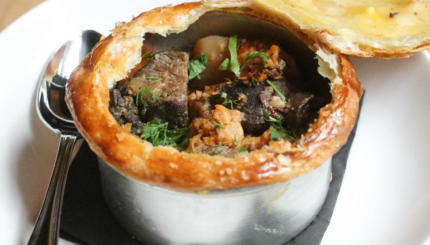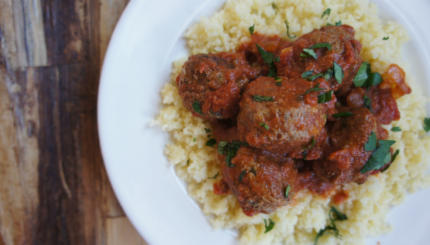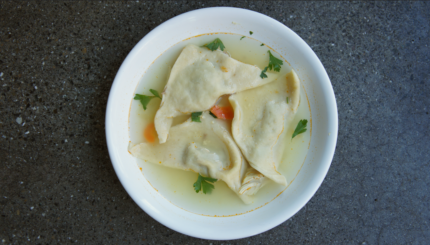Cholent is a traditional Jewish stew eaten on the Sabbath. Ingredients are placed in a pot or a slow cooker before Shabbat begins, and left on until lunch on Saturday.
In the old days in Central and Eastern Europe, the pot was hermetically sealed with a flour‑and‑water paste and taken to the baker’s oven, and the men and children fetched it on their way home from the synagogue. Jewish bakeries in the East End of London continued the tradition, and on Saturdays their ovens were full of copper pots brought over from Russia and Poland. They would give metal tags with numbers for people to retrieve the pots and used a paddle to pull them out.
The basic traditional cholent is meat, potatoes, barley, and beans. The traditional accompaniments, which are cooked in the same pot, are of German origin. They include kishke (a sausage filled with a flour‑and‑onion stuffing) and various knaidlach—all part of the dumpling family of foods. There is good reason for the saying that cholent is so heavy that “people have to go to the synagogue on Sunday to pray for their stomach to recover.”
Here are some of our favorite cholent recipces:
With your help, My Jewish Learning can provide endless opportunities for learning, connection and discovery.
Traditional Cholent
Vegetarian Cholent
Italian Cholent
Indian Cholent
Polish Cholent
Texas Cholent No 9
cholent
Pronounced: CHO-lent, Origin: Yiddish, but believed to be derived from French, a slow-cooked stew traditionally prepared for and left cooking over Shabbat.
kishke
Pronounced: KISH-kuh, Origin: Yiddish, literally "intestine," this usually refers to a sausage-like dish. It's also used to connote a strong emotional connection to something, as in "I feel it in my kishkes."
Shabbat
Pronounced: shuh-BAHT or shah-BAHT, Origin: Hebrew, the Sabbath, from sundown Friday to sundown Saturday.


